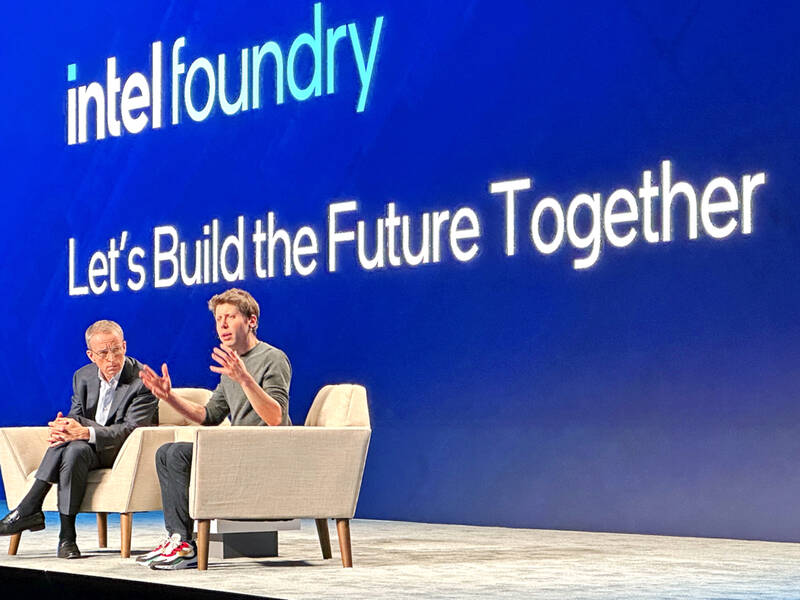Intel Corp has landed Microsoft Corp as a customer for its made-to-order chip business, marking a key win for an ambitious turnaround effort under chief executive officer Pat Gelsinger.
Microsoft plans to use Intel’s 18A manufacturing technology to make a forthcoming chip that the software maker designed in-house, the two companies said at an event on Wednesday.
They did not identify the product, but Microsoft recently announced plans for two homegrown chips — a computer processor and an artificial intelligence (AI) accelerator.

Photo: AP
Intel has been seeking to prove it can compete in the foundry market, where companies produce custom chips for clients. It is a major shift for the semiconductor pioneer, which once had the world’s most advanced chipmaking facilities and kept them to itself. These days, Intel is racing to catch up with companies such as Taiwan Semiconductor Manufacturing Co (台積電), which leads the foundry industry.
Meanwhile, Microsoft is looking to secure a steady supply of semiconductors to power its data-center operations — especially as demand for AI grows. Designing its own chips also lets Microsoft fine-tune the products to its specific needs.
“We need a reliable supply of the most advanced, high-performance and high-quality semiconductors,” Microsoft chief executive officers Satya Nadella said in a statement. “That’s why we are so excited to work with Intel.”
The broader industry has struggled to get enough advanced silicon — particularly Nvidia Corp’s highly prized accelerator chips, which help develop chatbots and other AI services.
For Intel, securing a large customer for its foundry business should help reassure investors that Gelsinger’s comeback bid remains on track. His plan involves building out the chipmaker’s factory operations to handle the increased load — a costly gamble — as well as restoring Intel’s once-dominant technological prowess.
The company is looking to governments in the US and Europe to help defray the costs, and seeing Microsoft on board might help that effort.
Intel has held talks with the administration of US President Joe Biden to secure more than US$10 billion in subsidies under the Chips and Science Act, Bloomberg reported last week.
Microsoft and cloud-computing rivals Amazon.com Inc and Alphabet Inc’s Google are among the largest buyers of advanced chips, which they use to power their data centers. They have increasingly turned toward using their own designs — a trend that’s hurt Intel in its most lucrative business. Acting as a foundry for Microsoft and others could help grab back at least a portion of that lost revenue.

In Italy’s storied gold-making hubs, jewelers are reworking their designs to trim gold content as they race to blunt the effect of record prices and appeal to shoppers watching their budgets. Gold prices hit a record high on Thursday, surging near US$5,600 an ounce, more than double a year ago as geopolitical concerns and jitters over trade pushed investors toward the safe-haven asset. The rally is putting undue pressure on small artisans as they face mounting demands from customers, including international brands, to produce cheaper items, from signature pieces to wedding rings, according to interviews with four independent jewelers in Italy’s main

Macronix International Co (旺宏), the world’s biggest NOR flash memory supplier, yesterday said it would spend NT$22 billion (US$699.1 million) on capacity expansion this year to increase its production of mid-to-low-density memory chips as the world’s major memorychip suppliers are phasing out the market. The company said its planned capital expenditures are about 11 times higher than the NT$1.8 billion it spent on new facilities and equipment last year. A majority of this year’s outlay would be allocated to step up capacity of multi-level cell (MLC) NAND flash memory chips, which are used in embedded multimedia cards (eMMC), a managed

Japanese Prime Minister Sanae Takaichi has talked up the benefits of a weaker yen in a campaign speech, adopting a tone at odds with her finance ministry, which has refused to rule out any options to counter excessive foreign exchange volatility. Takaichi later softened her stance, saying she did not have a preference for the yen’s direction. “People say the weak yen is bad right now, but for export industries, it’s a major opportunity,” Takaichi said on Saturday at a rally for Liberal Democratic Party candidate Daishiro Yamagiwa in Kanagawa Prefecture ahead of a snap election on Sunday. “Whether it’s selling food or

In the wake of strong global demand for AI applications, Taiwan’s export-oriented economy accelerated with the composite index of economic indicators flashing the first “red” light in December for one year, indicating the economy is in booming mode, the National Development Council (NDC) said yesterday. Moreover, the index of leading indicators, which gauges the potential state of the economy over the next six months, also moved higher in December amid growing optimism over the outlook, the NDC said. In December, the index of economic indicators rose one point from a month earlier to 38, at the lower end of the “red” light.